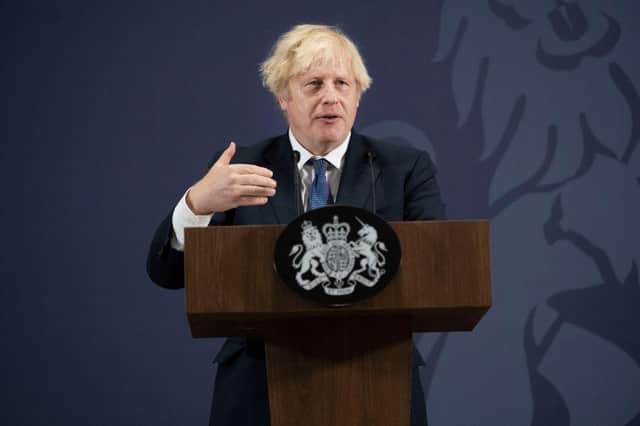Boris Johnson levelling up speech: This isn’t a policy strategy, it’s a branding strategy


Prime Minister Boris Johnson today made his latest in a lifelong series of attempts to use as many words as possible to say absolutely nothing.
At 4272, it wasn’t quite a record, but a valiant effort nonetheless.
Vague
Advertisement
Hide AdAdvertisement
Hide AdPerhaps that’s slightly unfair, but only slightly. Johnson’s speech was not so much peppered with his trademark verbosity as avalanched in it, and there was little substance to be found beneath the questionable analogies and flowery metaphor.
The bulk of the policy announcements were actually re-announcements, and the stuff that was new was mostly very vague. The most interesting and novel aspect of the speech was Johnson’s commitment to devolution. There was little detail beyond an open invitation for local and regional leaders to bring forward plans of their own, but it was a signal of political will, if nothing else.
Johnson’s history as a metropolitan mayor with a whole host of devolved powers is often undervalued in estimations of his politics. He has seen and enjoyed the benefits of these powers as a two-term London mayor and this may well inform a desire to extend them to the rest of the country. Given his experience, he may even be almost uniquely well-positioned to deliver this programme.
A less charitable take on Johnson’s sudden interest in decentralisation is that, to move power is to move responsibility.
Advertisement
Hide AdAdvertisement
Hide AdThe speech was vague and not particularly coherent. It didn’t feel like it was built naturally around a single idea or narrative, but rather that it jumped between disparate topics in hopes of making them appear to be linked.
The question is whether this vagueness was a flaw of the speech, or is a feature of the subject of the speech.
A policy of nothing
Levelling up increasingly seems not to be a policy or a political strategy, but just branding. A label which can be applied to almost anything to give the illusion of a grand narrative or plan. Increase the number of police? That’s levelling up. Money for football pitches? Levelling up. Support for first-time buyers? You guessed it, levelling up!
That’s not to say that all of the policies contained under this levelling up umbrella are bad, but it remains to be seen whether they actually cohere to offer solutions to the overarching problems they ostensibly gesture at, or whether they’re just a grab-bag of fairly typical policies.
Advertisement
Hide AdAdvertisement
Hide AdFormer PM Theresa May rebelled against the government for the first time earlier this week, in a vote on foreign aid spending. In 2016, she said that to be a citizen of everywhere is to be a citizen of nowhere. You wonder whether, looking at her successor’s marquee agenda of ‘levelling up’, she might conclude it is flawed because it is a policy of everything, which makes it a policy of nothing.
That said, one of Johnson’s most important personal traits, in terms of understanding his political success, is his ability to be all things to all people. It doesn’t help with the running of a country, particularly, but it’ll help to get you elected.
Levelling up, a seemingly all-things-to-all-people policy, might well be the same.
Comment Guidelines
National World encourages reader discussion on our stories. User feedback, insights and back-and-forth exchanges add a rich layer of context to reporting. Please review our Community Guidelines before commenting.